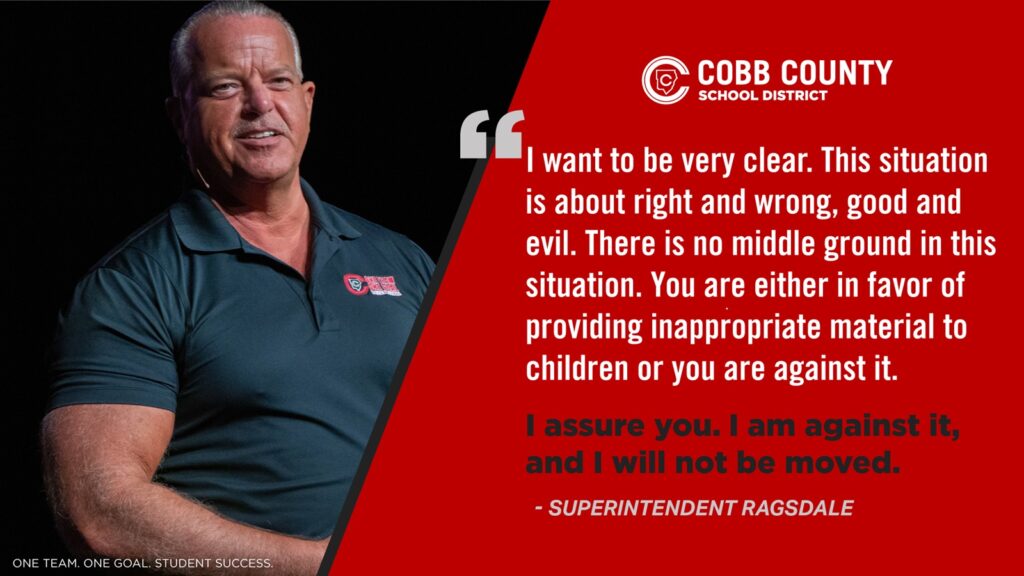Superintendent: Educators have ‘professional obligation to protect students from lewd and vulgar materials’
In a powerful school board meeting speech, the superintendent of Georgia’s Cobb County Schools said educators who provide sexually explicit materials to children should not be in the…

In a powerful school board meeting speech, the superintendent of Georgia’s Cobb County Schools said educators who provide sexually explicit materials to children should not be in the classroom.
“Anyone working in education who knowingly provides students with access to sexually explicit material, should not be in a position of educating other parents’ children,” said Superintendent Chris Ragsdale in a video from the meeting, shared widely on social media.
The audience interrupted Ragsdale numerous times with approving applause during the monologue.
Ragsdale has faced some criticism for using his authority as superintendent to remove books from the district he thinks have sexual content inappropriate for children.
The National Women’s Law Center (NWLC) has filed a complaint with the Department of Education’s Office for Civil Rights, claiming the book removals create a “hostile environment for” children.
NWLC filed the complaint under Biden’s pro-LGBT re-interpretation of Title IX of the Civil Rights Act of 1964.
“As long as I am the superintendent of the Cobb County School District, I will work tirelessly to ensure your children are not given unrestricted access to materials containing lewd, vulgar, and sexually explicit content, nor will your taxes be used to fund it,” Ragsdale said previously about book removals, reported local WSB News radio.
In his board meeting speech, Ragsdale explained that under the law in Georgia and the U.S. Constitution, educators can’t simply hide behind school policies, but have an affirmative duty to protect children from vulgar, inappropriate materials.
“The law has long held that the unique custodial and instructional mission of schools explicitly imposes this obligation. In 1986, the United States Supreme Court supported a school district disciplining a high school student for using lewd and vulgar language during a speech at school, declaring ‘vulgar, lewd speech and lewd conduct is wholly inconsistent with the fundamental values of a public school education,’” Ragsdale said.
Indeed, in Bethel School District v. Fraser, the court found that public “schools, as instruments of the state” may restrict “lewd, indecent, or offensive speech and conduct.”
The court found that restrictions on the distribution of sexual material to children were already lawful, without violating First Amendment rights on freedom of expression.
Ragsdale called the practice of exposing children to lewd and sexually explicit materials a “radical new idea” that “less than five years ago would have seemed ridiculous and dangerous.”
Since August 2023, Cobb County Schools has removed the following books, containing inappropriate sexual material, said WSB News radio:
- “Me, Earl, and the Dying Girl” by Jesse Andrews
- “Flamer” by Mike Curato
- “Blankets” by Craig Thompson
- “It Ends with Us” by Colleen Hoover
- “The Perks of Being a Wallflower” by Stephen Chbosky
- “Lucky” by Alice Sebold
- “Thirteen Reasons Why” by Jay Asher.
Critics complained Ragsdale bypassed the system whereby parents object to a book and then it is reviewed by a committee for a decision on its suitability.
Ragsdale countered by saying his affirmative duty as a custodian for children requires him to act to protect children, regardless.
“Yes, we have a policy for parents to challenge materials they believe are inappropriate. However, as professional educators, we have an independent professional obligation to protect students from lewd and vulgar materials regardless of whether any parent group or outside entity files a complaint [that] is both legally recognized and completely independent of our processes for handling parental or external complaints,” he said.
He also said that despite the criticism of how he removed books, “this has consistently been the law in this state for over 50 years.”
Taking a stand against exposing children to sexually explicit material isn’t a political position, or a matter of faith, or religious belief, the superintendent explained.
“This situation is about right and wrong, good and evil. The sexualization of children can never be defended, nor allowed in any context, especially in education,” Ragsdale concluded.



